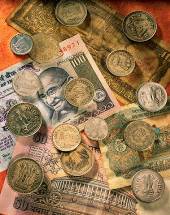 After initial hiccups, the government's ambitious Direct Benefits Transfer programme through a Unique Identification number kicked off smoothly on Tuesday, though the number of transactions by banks remained low.
After initial hiccups, the government's ambitious Direct Benefits Transfer programme through a Unique Identification number kicked off smoothly on Tuesday, though the number of transactions by banks remained low.
While about 2,000 beneficiaries were transferred an amount of Rs 35 lakh (Rs 3.5 million) on the Aadhaar platform, the figure is expected to go up on Thursday.
The programme is aimed at covering 200,000 beneficiaries.
"The implementation was glitch-free. The system has worked," said a government official, adding the number of transactions was expected to go up in the coming days.
On Tuesday being the first day, many government departments could not transfer the money before the closing hours (3 pm) for bank transactions.
"Some departments have sent advice (to transfer the money) after 3 pm. So that will come tomorrow," the official added.
The amount was transferred through the National Payments Corporation of India to eight banks for seven schemes, mostly education scholarships, in 20 districts, later transferred to the accounts of beneficiaries in 23 banks.
Earlier, the government had planned to roll out the scheme in 51 districts from January 1. The number of districts was first reduced to 43 and later to 20, owing to lack of preparedness in many of these districts.
The transfers were made in these districts even to the beneficiaries who did not have Aadhaar-linked
The official clarified these 2,000 transactions carried out by the banks on the first day of the programme were only towards Aadhaar-enabled accounts and that the total amount transferred by the Central government ministries to various beneficiaries was much higher.
"We have been told 85-90 per cent of the beneficiaries have a bank account, but not all of them have an Aadhaar number.
"As more accounts are seeded with Aadhaar, the number of transactions would go up," said the official.
The government will transfer cash benefits such as scholarships, pensions, and MNREGS (Mahatma Gandhi National Rural Employment Guarantee Scheme) wages directly to the bank or post office accounts of identified beneficiaries.
Eleven more districts will be added to the scheme on February 1, followed by 12 more districts in March, taking the total number of districts to 43 in the first phase.
The districts covered under DBT from on Tuesday are in Karnataka, Puducherry, Chandigarh, Punjab, Delhi, Madhya Pradesh, Rajasthan, Andhra Pradesh, Daman & Diu.
Through this direct cash transfer scheme, the government is expecting to check leakages in various subsidies and benefits given to the beneficiaries.
However, food, fertiliser and petroleum subsidies, which mainly cause the pain to government finances, are not kept under the scheme at the moment.








 © 2025
© 2025